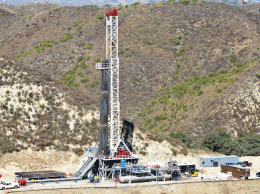Venoco CEO Tim Marquez, a former petroleum engineer, has proven that he has the shareholder votes to take his company private. But does he have the money?
The question came into sharp focus on June 5, when Venoco shareholders approved Marquez’s bid to buy the 49 percent of the company’s shares he doesn’t already own despite the fact that he has yet to give details on how he would gather the nearly $400 million in financing needed to close the deal.
Marquez has until June 12 to show a special committee of Venoco’s board how he would finance the deal or else request an extension. The company has already said it’s likely to grant one, but an extension could be a sign that financiers are skeptical that the timing is right for a going-private transaction when oil prices are slipping.
So far, the markets appear to be withholding judgment on whether Marquez can find the funds. When Marquez made his offer to buy out shareholders at $12.50 a share, the price represented a premium of nearly 30 percent to the going price. But on June 5, when shareholders approved the deal, shares closed at $9.65. The discounted price suggests some investors are skeptical about the closing.
Marquez founded Venoco in 1992 with his savings and a credit card. Since then, he has fought tenaciously to retain control of the firm, whose headquarters he moved to Denver while retaining a workforce of 180 in the Tri-Counties. Marquez owns 50.3 percent of Venoco, and he won a majority of minority shareholder approval to take the firm private again.
Marquez’s bid has sparked controversy at every step as investors questioned whether it benefited them or Marquez.
Angry shareholders insisted that Marquez had timed his deal when the stock was trading at unusually low prices, and analysts pointed out that the deal valued the company at about $770 million, which was less than the $842 million value the company put on its assets shortly before Marquez sent his bid. Company representatives point to a fairness opinion by Bank of America Merrill Lynch that found the deal sound and the fact that Venoco opened its books to a number of potential other buyers, none of whom were willing to top Marquez’s offer.
To keep in line with shareholder rights rules, Venoco created a special committee on its board of directors to negotiate with Marquez, who is also a director. After four months of wrangling in which Marquez lowered his bid and then raised it back to his original offer, the board and Marquez both agreed to the $12.50 a share price.
In public filings, the company said Marquez will need $385 million to $400 million to close the deal. But shareholders have no details on how that financing will be arranged. Venoco has agreed to reimburse Marquez up to $4 million in costs if the deal doesn’t go through by Oct. 16.
The going-private offer takes place against the background of Marquez’s ambitions for the so-called Monterey Shale, a rock formation several miles beneath the surface inland in California. Since raising $100 million in a 2006 IPO, Venoco has become one of the largest holders in the formation, alongside larger firms such as Occidental Petroleum.
As of yet, the Monterey Shale has not been cracked in a cost-effective way. The acquisitions were a bet that Marquez, with his engineering background, could find a way to retrieve the deep-buried resources. But falling oil prices tied to weak global demand spurred by Europe’s economic woes has caused investors to question Marquez’s strategy, which hasn’t yet generated promising results in the Monterey Shale.
Mike Edwards, vice president of corporate and investor relations, said that other shale formations have taken much more activity to prove profitable than the Monterey formation has seen.
“If you look at some of the other shale plays, like the Bakken Shale in North Dakota, the advancements are made because of the number of people trying it,” Edwards said. “The number of wells we’ve drilled compared to what it took for the Bakken to advance — it’s going to take more people doing different things.”






 Print
Print Email
Email

















